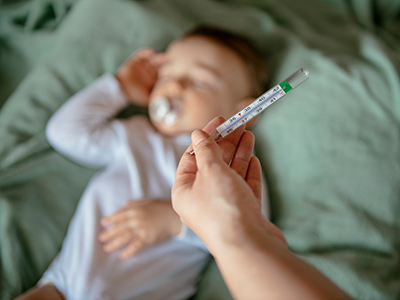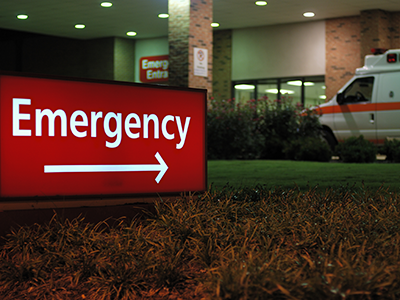It can sometimes be hard to know when something is wrong with your newborn baby, since they can’t tell you how they are feeling. This article discusses some things to look out for in your baby that could be signs that they need to go to the emergency department (ED) to be evaluated by a medical provider. Please remember that this list is not exhaustive, and you should always call your pediatrician if you have any concerns about your baby. Your pediatrician can also help guide you regarding whether you need to be seen immediately in the ED or if you should be seen in their office. However, if you have concerns but are unable to reach your pediatrician, you should come to the ED.
1. Fever
A fever is considered to be a temperature higher than 100.4°F (38.0°C). A fever is always an emergency in a newborn baby that is less than 2 months old. If your newborn has a fever, you should contact your pediatrician. If you are unable to contact your pediatrician, you should bring your baby to the emergency department so that they can determine what additional testing is needed. Do not give any Tylenol before going to the emergency department, because they will want to see if your baby still has a fever once you arrive.
2. Excessive sleepiness or irritability
If your baby is much sleepier than usual, not waking up to feed, very irritable or otherwise not acting like his or herself, this could also mean that they have an infection or another problem. If you are concerned that your baby is acting unusually, it is a good idea to take their temperature to see if they have a fever. Even if they do not have a fever, you should take them to the emergency department if you are worried that they are not acting normally. The medical providers in the emergency department will examine your baby carefully and may recommend additional testing.
3. Decreased urine output
Urine output in babies is a good indicator of whether or not they are dehydrated. Sometimes babies become dehydrated because they aren’t eating enough or because they are having vomiting or diarrhea. If your baby has urinated less than 3 times in a 24 hour period (or less than once every 8-10 hours), this is concerning for dehydration. In this case, you should bring your baby to the emergency department because they might need to get extra fluids through an IV.
4. Difficulty breathing
Signs that your baby is having difficulty breathing include retractions when breathing (ribs appear to stick in and out while breathing), nostrils flaring (getting bigger) when breathing, grunting noises with breathing or breathing very quickly (more than 60 times per minute continuously). If your baby is having difficulty breathing, you should bring them to the emergency department. Of note, it can be normal for babies to sometimes take a pause in their breathing for up to 10 seconds, then have a few fast and shallow breaths, and then start breathing normally again. This is called periodic breathing.
5. Color change, loss of consciousness or breathing abnormalities
Sometimes babies can have episodes where they change color (ex: turning blue or purple), lose consciousness or become unresponsive and/or stop breathing for a period of time. These episodes are always scary for parents. Oftentimes these episodes are not concerning and do not happen again, but sometimes they can be a sign that there is something wrong. If your baby has one of these episodes, it is recommended that you bring them to the emergency department to be evaluated so that the medical providers can decide if they need additional testing or observation in the hospital.
6. Injuries or falls
If your baby has a fall, it is always a good idea to call their pediatrician to get their advice for what to do. If they are acting normally, eating well, do not seem to have any injuries and do not have any vomiting afterwards, you might not need to go to the emergency department. If they lose consciousness, are acting abnormally (ex: very sleepy, crying constantly, floppy), are vomiting, are refusing to move one of their limbs or have obvious bruising or bleeding, you should bring them to the emergency department for further evaluation.
Other resources
 https://riseandshine.childrensnational.org/wp-content/uploads/2019/09/Emergency-department-sign-feature.jpg
300
400
Rise and Shine
https://riseandshine.childrensnational.org/wp-content/uploads/2017/11/childrens_riseandshine_logo.jpg
Rise and Shine2022-11-22 07:00:532022-11-22 11:35:08When to take your child to the emergency department
https://riseandshine.childrensnational.org/wp-content/uploads/2019/09/Emergency-department-sign-feature.jpg
300
400
Rise and Shine
https://riseandshine.childrensnational.org/wp-content/uploads/2017/11/childrens_riseandshine_logo.jpg
Rise and Shine2022-11-22 07:00:532022-11-22 11:35:08When to take your child to the emergency department


 Lauren Dzera, MD, is a pediatric resident at Children's National Hospital with an interest in pediatric emergency medicine.
Lauren Dzera, MD, is a pediatric resident at Children's National Hospital with an interest in pediatric emergency medicine.






Leave a Comment
Want to join the discussion?Feel free to contribute!